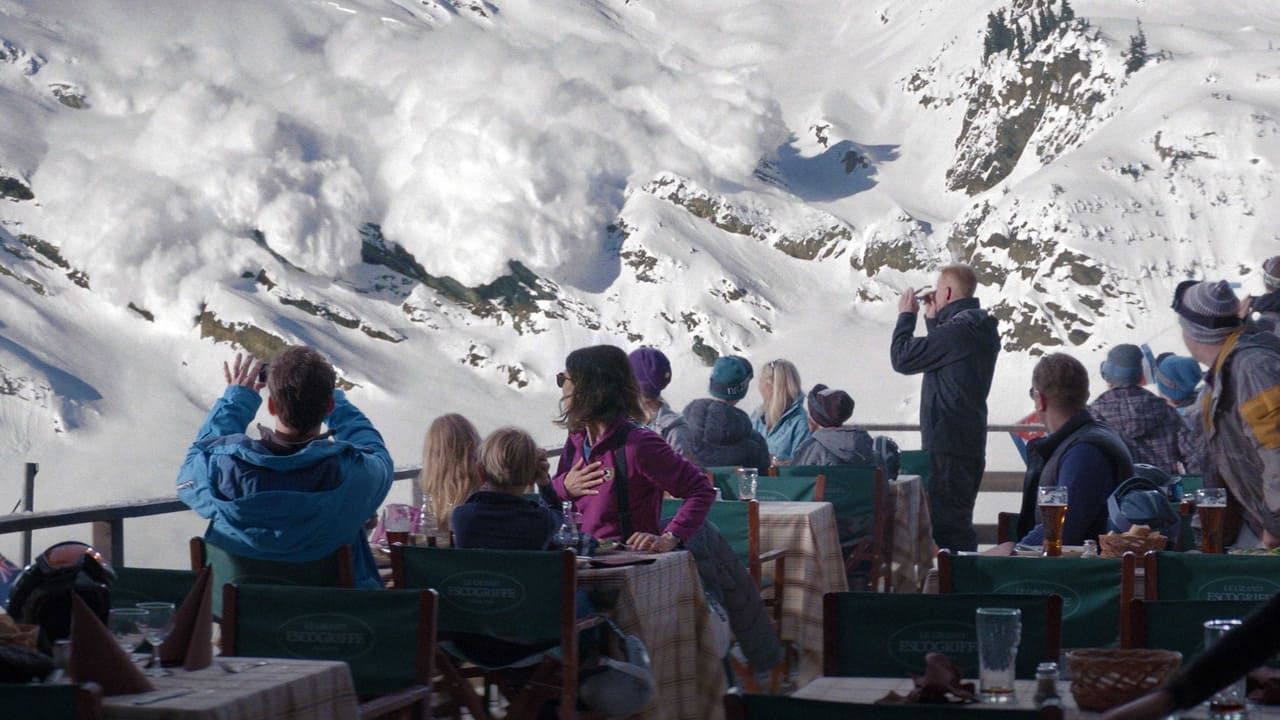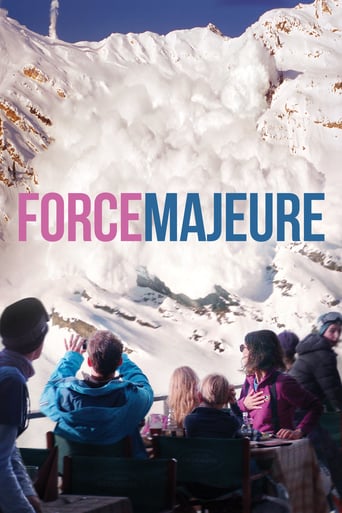Vonia
Force Majeure (Swedish: Turist) (2014) This was a film about snow, families, marriages. Mostly, though, about the survival instinct. A Swiss family takes a vacation in the French Alps. A workaholic father, an attentive and loving mother, a son and a daughter, brother and younger sister. Tomas, Ebba, Vera, Harry. Plus Ebba's girlfriend, who seems to relish a polygamous lifestyle, Charlotte. Mats, an old friend of Tomas's, and his young twenty year old lover, Fanny. Day One. Family together, skis, uneventful. Ends with Vivaldi. Day Two. Family skis in the morning. Lunch, it becomes Avalanche Day. When Tomas grabs his belongings, runs from the scene. Escaping the avalanche, which fortunately never makes impact. Away from his wife. Away from his children. Away from his son calling, "Daddy!". Ebba looks around; she has never experienced anything like this in her life; she is scared; she clutches her children, looking for her husband. Vanished. Laughing, he returns to the table a few minutes later, as if nothing were wrong in the world. That night, dinner with Charlotte and her current man. Tomas insists he did no such thing, he would never run away, of course not. Ebba, plainly shocked into speechlessness. More sharp Vivaldi Concerto No. 2 chords. Day Three. Ebba wants an alone day. She returns to have dinner with Tomas' friends, finally admitting out loud how depressed she is that Tomas denies fleeing from get and the kids. Expressed how afraid she was. Tomas says nothing, even after they watch the video he filmed, clearly showing him running away. Discussion regarding survival instincts. Fanni tells Mats that she feels he would probably react as Tomas had because of his personality. He understandable takes offense and things are different between them after that. Vivaldi. Day Four. Guys day. Mats & Tomas are skiing alone. Mats convinces Tomas to try scream therapy. Tomas feels better. He returns to the hotel but cannot find Ebba. He goes back out and finds himself at a rave party. Non Vivaldi screaming music with sharp chords. Screams more. Pivotal scene. Outside their room, as they're children eavesdrop and hug each other in consolation, Thomas cries out that he hates that bad part of him, that he also suffers. Hates his cowardice. Here cheated in games with the children. Confesses to cheating in past. Final Day. Very foggy day. Ebba is lost in the snow. Tomas tells the children to stay where they are, leaves them to search for his wife. Follows her voice, successfully carries her back to reunite his family. Film ends with another scene showing how we react in survival situations. A bus ride down a winding mountain with sharp turns and driver is obviously not very skilled. Ebba panics, demands to be let out. Overreacting? The bus full of tourists is panicking, screaming, rushing out. Mats very firmly tells everyone to leave in a logical manner, women and children first, otherwise people will get hurt. Success. Charlotte (who previously stated she loved risks) remains in the bus along with a handful of others. Would the purpose of this scene be to show that Ebba can also overreact in what she deems to be a survival instincts situation? Still, she stays with her children by her side. They walk down the mountain. Close curtain. Three things. From a psychological standpoint, I liked this film, its exploration of what we do in a fight or flee survival situation, its refusal to take a side. Secondly, I personally do not feel that Tomas redeemed himself by saving Ebba on the last day of their vacation. Though since Ebba does not seem to want a divorce, I can see why she convinced herself that he did. Thirdly, weird music, sharp Vivaldi that serves as an interlude between days, maybe as foreshadowing to danger, was not to my liking. Other scenes of whiteness and snow and emptiness played well into overall message in film. For this film, the typical Scandinavian somber tone is apposite. Great camera work,
Simple premise plays out well.
Gives much to ponder. Haibun, "haikai writings", is a prosimetric (written partly in prose and partly in verse) poem in which a haiku is included after the prose, serving as its climax or epiphany.
#Haibun #PoemReview
Per Johnsen
Why this film was nominated for Golden Globe and won Guldbaggen and other film prizes, must be simply because some important people in the juries recognize the kind of life rendered in the movie, and for only this reason find it amusing and enjoyable in a parody fashion. I simply find it boring. The director of this mediocre project has won the Palme d'Or for his latest film, the Square. I really hope it's far better than Tourist, or Ruben Östlund must hit some cinematic nerve that I just don't understand, and never want to understand either. I really don't think he has found any nerve in directing the actors in this film other than making it annoying. They are mainly overacting and some times remind me of the many horrific Norwegian films from thirty years ago or so. Are they supposed to be funny? They are not, nor is the effect of the on and off sudden music score, with an accordion playing Vivaldi on over speed. Please casters, there are other and much better actors if you just look a bit outside the regular click in Oslo and Stockholm. Only the non professional kids seem actually natural in their acting, and well acting children is always a plus, one of the few in this more or less dull film. It's the main reason for giving it as much as 3 stars.
Tweekums
When Swedes Tomas and Ebba, along with their children Vera and Harry, go on a skiing holiday in the French Alps it should have been a fun vacation for all of them but then an avalanche strikes. Nobody is hurt but Tomas and Ebba's relationship is shaken to its core as he grabbed his phone and ran leaving her to look after the children; something he won't admit to; even to himself. Ebba tries to talk about it but he avoids the subject; then she brings it up again when they are having an evening with Norwegian friends Mats and Fanni leading to a very uncomfortable evening for all involved. As the holiday continues they talk about how one reacts in the face of danger and question how many of us would be brave and how many would instinctively try to save themselves.When I started watching this I didn't really know what to expect but certainly didn't expect an almost entirely character driven drama. They may have been in the French Alps but most of the action takes place in the confines of the hotel. The conversations are frequently painful to watch; not because they are poorly acted, far from it, but because it is so awkward… so much so that I was frequently reminded of the classic 1977 TV Play 'Abigail's Party'… perhaps the epitome of awkwardness. When they do get out onto the snow there is a sense of danger; especially when Tomas tries to prove his manliness by taking his family skiing in dense fog. Even the ending, has a surreal sense of danger. The relatively small cast does a really fine job making us believe in the characters and the way their relationships are changing because of what happened. While this is mostly a drama there are some laugh out loud moments as things get just a little surreal at times. I'd recommend this to anybody who likes their drama to be character driven and don't mind frequent, long, awkward silences. It also makes one ask what you would have done in Tomas's position; we all hope we'd try to protect those close to us but ultimately don't know and hope we will never be tested.

